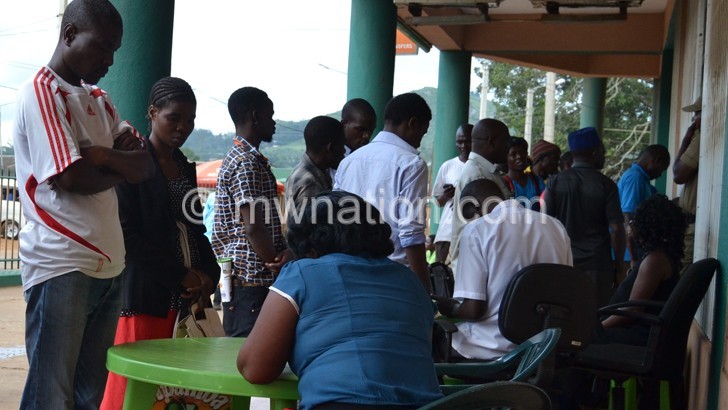Chaos in SIM card registration suspension
Confusion seems to have rocked the mandatory SIM card registration exercise following government’s announcement of its suspension in Parliament on Tuesday.
WhileThe Nation learnt that three days after announcing the suspension, mobile phone operators continued with the exercise, mainly in urban areas, government stated there was “no law that was being broken.”
Spot-checks yesterday showed queues of people registering their numbers in several points, confirming that the exercise was underway regardless of the suspension pronouncement made by Minister of Information and Communications Technology Nicholas Dausi.

As of yesterday, TNM and Airtel, the country’s two leading mobile phone network providers, had not yet been officially told of the suspension; hence, the continuance of the exercise.
“We are waiting official communication from the relevant authorities on the same,” said Airtel Malawi spokesperson Norah Chavula-Chirwa in a brief interview.
The mobile phone service providers were formally advised by Malawi Communications Regulatory Authority (Macra) to carry out the exercise as a result of the passing of the revised Communications Act.
In an interview yesterday, Macra communications manager Clara Mwafulirwa referred the matter to the ministry.
However, Dausi said in an interview yesterday the law gives powers to the network service providers through Macra to register all SIM cards and by registering subscribers’ numbers, they were not committing any crime.
“That is what the law which was passed says, so if somebody goes to register he or she has not committed any crime. Regarding the suspension, we thought for people in the countryside, first of all there must be proper structures and well-trained manpower before the exercise could extend there,” he said.
But on Tuesday Dausi, who is also government official spokesperson, issued a blanket statement without any conditions attached to the exercise.
He said: “… Listening to the concerns, I would like to announce that we have suspended the SIM card registration process until necessary remedial measures are taken.”
The SIM card registration suspension is one of several policy reversals the Peter Mutharika administration has made over the past few months due to public backlash.
Some of the policy inconsistencies include the Road Traffic fees suspension, reversal of Blantyre Water Board’s water tariff hike and the reduction of University of Malawi fee hike.
But policy and political analysts have described such policy flip-flopping as risky and costly to a nation with a wobbling economic status.
“Such policy U-turns show that government does not do proper homework. Policy formulation is a process and within that process, every policy must be backed up with evidence.
“In other words, when government formulates a policy and later on reverses it, it means it hurried through… some procedures in the process were skipped,” explained Andrew Mpesi, a Chancellor College (Chanco) political scientist.
On the other hand, he said, such reversals signify that citizens are well-informed.
“Our citizenry is well-informed to the extent that it can question government policies that had been instituted without evidence and also jumped the policy making cycle,” said Mpesi.
Mustapha Hussein, a political science and administrative studies associate professor also at Chanco, observed that such inconsistencies bring uncertainty among the people of what direction government will take.
“Again, it reflects some fragmentation in the way some decisions are made. It suggests that before a decision is taken, it is not preceded by widest consultations and clarity on the issues before embarking on exercises,” he said.
Hussein also said the development becomes costly as taxpayers resources are wasted through public officers’ meetings, time, efforts and expenses on forums where such decisions are made.
“But the greater concern is the indecision which raises questions on government’s decision-making processes,” he said.
According to Macra, the mandatory registration of SIM cards will help prevent crime and fraudulent cases that are on the rise as it will enable security enforcement agencies to trace perpetrators using information provided to network providers.n





